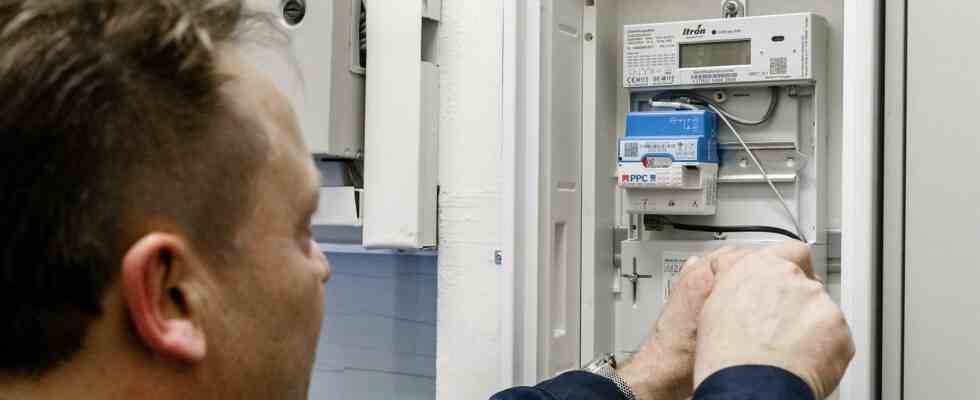Status: 01/11/2023 3:17 p.m
The federal cabinet has passed a draft law to restart the digitization of the energy transition. Intelligent electricity meters, so-called smart meters, play a central role in this.
How can the digitization of the energy transition be accelerated? The Federal Cabinet dealt with this question today and approved the draft for a “law to restart the digitization of the energy transition”. The starting signal for digitization in energy supply: intelligent electricity measuring devices, so-called smart meters.
Smart meters are digital, networked measuring devices for heat or electricity that automatically transmit consumption to the provider. This data can also be viewed by consumers at any time, for example on a smartphone app. By 2025 at the latest, all consumers should be able to use smart meters; According to the Economics Ministry, by 2030 most households and large consumers such as companies, schools and swimming pools should be equipped with it.
Save money on electricity consumption
The advantage for private customers: Ideally, electricity consumption – such as charging an electric car or doing laundry – can be shifted to times when electricity prices are low and network utilization is low. So, at best, the devices will save money once electric utilities make dynamic contracts the norm. At present, only electricity suppliers who supply more than 100,000 consumers have to offer their customers a dynamic electricity tariff with an intelligent metering system. But these tariffs will also be mandatory from 2025.
In addition to a better overview of consumption, smart meters also make it easier to manage the feeding of electricity from solar cells on your own roof. This could ensure optimal utilization of the electricity grid by better harmonizing electricity supply and electricity demand through the widespread use of smart meters.
The law is intended to create legal certainty
“The expansion of renewable energies and the greater use of electric cars in the transport sector and heat pumps in buildings require intelligent linking of electricity generation and consumption,” said Economics Minister Robert Habeck (Greens). He wants to make the smart meters, which already exist in countries such as Finland, Sweden, Italy and the Netherlands, from the exception to the norm in Germany as well, and that is why he presented the draft law on the “digitization of the energy transition” at the end of 2022.
In order to create legal certainty for the distribution of smart meters to electricity customers in a timely manner, the law should come into force in the coming months. So now it’s the Bundestag’s turn. However, it is still unclear how quickly the smart meters will reach individual customers. “The rollout [die Verteilung der Smart Meter] will be systematised, accelerated and reduced in bureaucracy,” Habeck promised today.
In addition, the annual costs for consumers are to be capped: in future, private households and small system operators should not pay more than 20 euros per year for an intelligent measuring system. In return, the network operators should be given a greater share of the costs.
Criticism of the distribution schedule
The Federal Association of Energy and Water Management today criticized Habeck’s draft law. It makes sense to control the power grid smartly in the future in order to ensure reliable grid operation. However, the association criticizes that the new regulations in many cases “ignore practice and hinder rather than support a plannable rollout for metering point operators,” says Kerstin Andreae, Chair of the BDEW Executive Board.
The Federal Office for Information Security had already given the go-ahead for the nationwide installation of intelligent electricity meters in February 2020. However, according to the draft law, this “rollout” is not progressing at the speed required for the energy transition – hence the “restart”. The reason for the delay is, among other things, a high administrative burden
Consumer and privacy advocates skeptical
Criticism of the new regulation also comes from consumer and privacy advocates. They worry about the amount of data going to the corporations. In addition, hackers could penetrate the systems.
There are also doubts as to whether it makes sense to install intelligent electricity meters in even the smallest of households. For the needs of the network operator, it is actually sufficient if, for example, a switch box on the transformer in the local network is intelligently controlled, said Detlef Fischer from the Association of the Bavarian Energy Industry. Because the new electronics need maintenance.
And the smart meters also consume electricity themselves – according to a study by the Federal Environment Agency (UBA), on average 26 kilowatt hours per year and thus three times as much as a conventional meter. In addition, the service life of the electronics is limited. The UBA assumes an average of twelve years. Sweden, Finland and Italy, which had equipped all households with intelligent electricity meters early on, are already replacing them completely for the first time.

